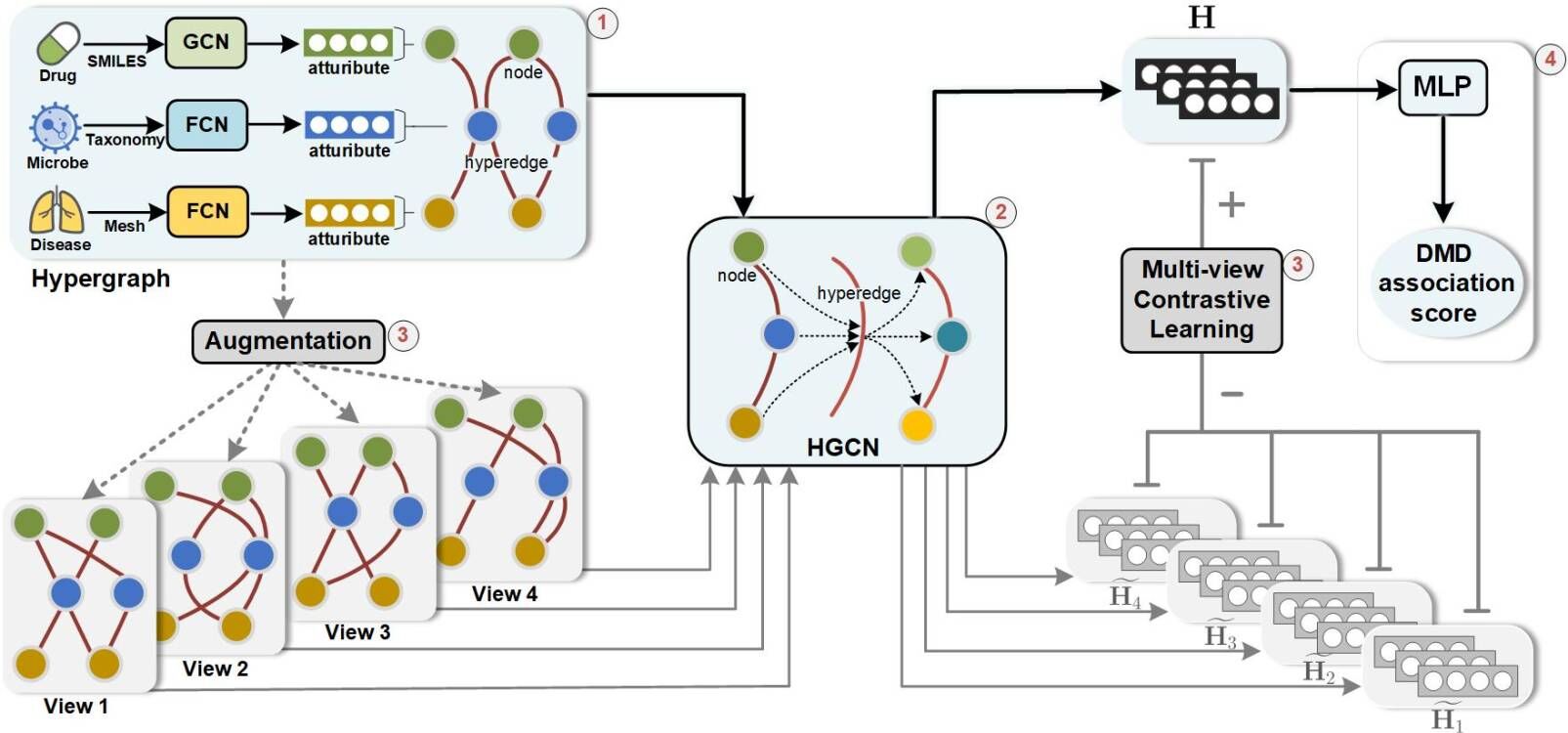南湖新闻网讯(通讯员 刘洛涛)近日,我校信息学院人工智能与知识发现团队在CCF A级人工智能国际会议“The 32nd International joint Conference on Artificial Intelligence (IJCAI-2023)”发表题为“Multi-view Contrastive Learning Hypergraph Neural Network for Drug-Microbe-Disease Association Prediction”的研究论文。研究团队提出了一种自监督超图神经网络方法,解决了现有模型多元关系预测性能较差以及在稀疏样本上性能欠佳的问题,并将其应用于药物-微生物-疾病三元关联预测,可用于指导发现微生物相关疾病的治疗药物。该项研究是AI for Science在药物发现领域的成功应用范例,致力于开发创新性的人工智能模型以解决生物医学健康领域的重要问题(模型框架如图1所示)。

图1:模型MCHNN的框架
现有研究表明识别药物、微生物和疾病之间的潜在联系,对于探索微生物相关疾病的发病机制、发现微生物相关疾病的治疗药物、实现精准医疗具有重要意义。目前,已有研究工作分别预测药物-微生物、微生物-疾病关联二元关联,无法直接预测药物-微生物-疾病(DMD)三元关联。因此,研究者希望借助超图神经网络(HGNN)来捕捉DMD超图背后的高阶交互模式,实现对三元关联的精准预测。然而,现在已知的DMD关联不足,形成的DMD超图较为稀疏,泛化能力欠佳。针对这一问题,研究团队在DMD超图上设计了一种新的多视图对比学习(CL)作为辅助任务,引导HGNN学习更多的判别表征,增强其泛化能力,最终构建了一种多视图对比学习超图神经网络,称为“MCHNN”,用于DMD关联预测。
作者将所设计的MCHNN和机器学习基础模型与三元关联相关的经典模型进行对比,运用该领域常见的两个指标Hit@n和Ndcg@n进行评估(其五折交叉验证的结果如图二所示)。大量结果表明,MCHNN在DMD关联预测方面取得令人满意的效果,更重要的是,研究团队设计的多视图CL在稀疏DMD超图上极为有效。此外,该工作可能将扩展跨学科研究,协助生物医学研究者们在海量数据中寻找可能相关的药物、微生物、疾病,找到能调控微生物从而治疗微生物失衡引起的疾病的相关药物,或是找到能协助药物治疗疾病的微生物,为机器学习和人工智能在精准医疗中的应用做出积极贡献。
我校信息学院硕士生刘洛涛、博士生黄锋为该论文共同第一作者,信息学院章文教授为通讯作者,信息学院博士生刘旋、熊展坤、李梦露和硕士生宋从智参与该研究。
会议链接:https://ijcai-23.org/
【英文摘要】
Identifying the potential associations among drugs, microbes, and diseases is of great significance in exploring the pathogenesis and improving precision medicine. There are plenty of computational methods for pair-wise association prediction, such as drug-microbe and microbe-disease associations, but few methods focus on the higher-order triple-wise drug-microbe-disease (DMD) associations. Driven by the advancement of hypergraph neural networks (HGNNs), we expect them to fully capture high-order interaction patterns behind the hypergraph formulated by DMD associations and realize sound prediction performance. However, the confirmed DMD associations are insufficient due to the high cost of in vitro screening, which forms a sparse DMD hypergraph and thus brings in suboptimal generalization ability. To mitigate the limitation, we propose a Multi-view Contrastive Learning Hypergraph Neural Network, named MCHNN, for DMD association prediction. We design a novel multi-view contrastive learning (CL) on the DMD hypergraph as an auxiliary task, which guides the HGNN to learn more discriminative representations and enhances the generalization ability. Extensive experiments show that MCHNN achieves satisfactory performance in DMD association prediction and, more importantly, demonstrate the effectiveness of our devised the multi-view CL on the sparse DMD hypergraph.
审核:章文